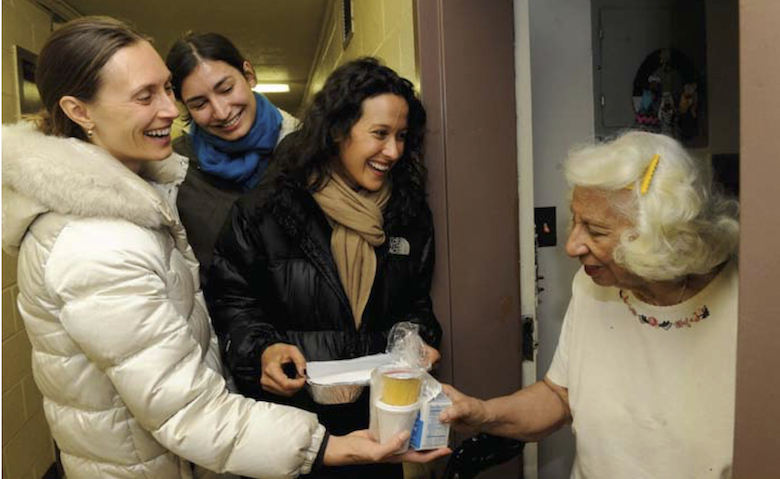
Roast turkey with cranberry sauce and sweet potatoes is the quintessential Christmas dinner—unless you grew up eating something else entirely.
Which is why Citymeals-on-Wheels, the not-for-profit that delivers physical and emotional nourishment to New York’s homebound elderly, does not have a one-feast-fits-all policy. Depending on the neighborhood and the senior center where the meals are made, clients get food tailored to their traditional tastes.
In Brooklyn neighborhoods with high Latino populations, that means roast pork teamed with rice and pigeon peas, the time-honored menu in Puerto Rico and the Dominican Republic. The Borinquen Plaza Senior Center in Bushwick, for instance, will be cooking up the classic Navidad dinner this December, according to director Esther Blanco. Head chef Ricardo Morales annually cook about 150 pounds of pork leg or fresh ham to serve 600 clients. The meat is marinated with rosemary and garlic, then slow-roasted to succulence for five hours and served with brown gravy. Dessert is poundcake with ice cream.
Citymeals, which turns 29 this Christmas and now feeds at least 16,000 New Yorkers every day of the year, bends over backward to deliver culturally appropriate foods year-round. Chinatown residents, for instance, might receive bok choy cooked in peanut oil, while Jewish recipients get Passover meals complete with roast chicken, matzo, gefilte fish and macaroons.
Many of these dinners will be walked to their recipients; as Citymeals-on-Wheels marketing director Beth A. Shapiro notes, it’s often “meals-on-heels” even in snowy or brutally cold weather, because parking is such a pain. (And six flights of stairs are not to be underestimated.) Luckily, the organization generally draws extra volunteers moved by the holiday spirit and blessed with time off from work. (Check out citymeals.org/volunteer if you want to help.)
In 1981, though, not only were there no special meals—too often there were no meals at all. Many homebound elderly were on their own with zero food for the holidays. When restaurant critic Gael Greene read about their plight in the New York Times, she called her friend James Beard, “thinking we could fill food baskets” for them. The two of them wound up raising $35,000 by telephone from the food world in one weekend.
On Monday we called the Department of Aging mentioned in the article and said we had $35,000 and some chickens to give, but “you can’t take one dime or quarter out for stamps or anything; it’s only for meals.’” That year, “6,000 people who would not have had a Christmas meal” were fed—which was 5,650 more than Greene and Beard had thought needed help.
Dollar donations have dropped in the last two years thanks to the bushwhacked economy and the Madoff rip-off, Greene says, but the organization still raised $19 million. She herself goes out once a year or so to deliver food, not least to feel less guilty about eating the lavish meals required by her job but also to see the need, and the range of recipients. Citymeals feeds “more than 100 who are over 100,” Greene says. Whether one lives in the home her husband built for her 70 years ago or in a sad single room, “steps from where you live, people are being fed.”
“Once you see the people you’re feeding and have a sense of the gratefulness, and the desperate austerity of their lives, and their isolation, you feel responsible,” she says. “it haunts you.”
In addition to the once-a-day meal, which is accompanied by a snack for later, every fall each elder on the delivery list gets a box containing 12 shelf-stable meals, Shapiro says, so they will have something to eat on days when the weather is too bad for volunteers to reach them and they’re back where they were before Citymeals—29 Christmases ago.



